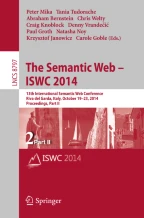Abstract
We identify a class of Horn ontologies for which standard reasoning tasks such as instance checking and classification are tractable. The class is general enough to include the OWL 2 EL, QL, and RL profiles. Verifying whether a Horn ontology belongs to the class can be done in polynomial time. We show empirically that the class includes many real-world ontologies that are not included in any OWL 2 profile, and thus that polynomial time reasoning is possible for these ontologies.
Chapter PDF
Similar content being viewed by others
Keywords
These keywords were added by machine and not by the authors. This process is experimental and the keywords may be updated as the learning algorithm improves.
References
Baader, F., Calvanese, D., McGuinness, D., Nardi, D., Patel-Schneider, P. (eds.): The Description Logic Handbook: Theory, Implementation, and Applications, 2nd edn. Cambridge University Press (2007)
Baader, F., Brandt, S., Lutz, C.: Pushing the \(\mathcal{EL}\) envelope. In: Kaelbling, L.P., Saffiotti, A. (eds.) IJCAI, pp. 364–369 (2005)
Baader, F., Lutz, C., Suntisrivaraporn, B.: CEL - a polynomial-time reasoner for life science ontologies. In: Furbach, U., Shankar, N. (eds.) IJCAR 2006. LNCS (LNAI), vol. 4130, pp. 287–291. Springer, Heidelberg (2006)
Baget, J.-F., Mugnier, M.-L., Thomazo, M.: Towards farsighted dependencies for existential rules. In: Rudolph, S., Gutierrez, C. (eds.) RR 2011. LNCS, vol. 6902, pp. 30–45. Springer, Heidelberg (2011)
Bishop, B., Fischer, F.: IRIS - integrated rule inference system. In: ARea (2008)
Bishop, B., Kiryakov, A., Ognyanoff, D., Peikov, I., Tashev, Z., Velkov, R.: OWLim: A family of scalable semantic repositories. Semantic Web J. 2(1), 33–42 (2011)
Calvanese, D., Giacomo, G.D., Lembo, D., Lenzerini, M., Rosati, R.: Tractable reasoning and efficient query answering in description logics: The DL-Lite family. J. Automated Reasoning (JAR) 39(3), 385–429 (2007)
Calvanese, D., De Giacomo, G., Lembo, D., Lenzerini, M., Poggi, A., Rodriguez-Muro, M., Rosati, R., Ruzzi, M., Savo, D.F.: The MASTRO system for ontology-based data access. Semantic Web J. 2(1), 43–53 (2011)
Carral, D., Feier, C., Cuenca Grau, B., Hitzler, P., Horrocks, I.: \(\mathcal{EL}\)-ifying ontologies. In: Demri, S., Kapur, D., Weidenbach, C. (eds.) IJCAR 2014. LNCS, vol. 8562, pp. 464–479. Springer, Heidelberg (2014)
Cuenca Grau, B., Horrocks, I., Krötzsch, M., Kupke, C., Magka, D., Motik, B., Wang, Z.: Acyclicity notions for existential rules and their application to query answering in ontologies. JAIR 47, 741–808 (2013)
Fagin, R., Kolaitis, P.G., Miller, R.J., Popa, L.: Data exchange: semantics and query answering. Theor. Comput. Sci. 336(1), 89–124 (2005)
Grosof, B., Horrocks, I., Volz, R., Decker, S.: Description logic programs: combining logic programs with description logic. In: WWW, pp. 48–57 (2003)
Horrocks, I., Kutz, O., Sattler, U.: The even more irresistible \(\mathcal{SROIQ}\). In: Doherty, P., Mylopoulos, J., Welty, C. (eds.) Proc. 10th Int. Conf. on Principles of Knowledge Representation and Reasoning (KR 2006), pp. 57–67. AAAI Press (2006)
Horrocks, I., Sattler, U.: A tableaux decision procedure for \(\mathcal{SHOIQ}\). In: IJCAI, pp. 448–453 (2005)
Hustadt, U., Motik, B., Sattler, U.: Data complexity of reasoning in very expressive description logics. In: IJCAI, pp. 466–471 (2005)
Kazakov, Y., Krötzsch, M., Simančík, F.: The incredible ELK: From polynomial procedures to efficient reasoning with \(\mathcal{EL}\) ontologies. J. Autom. Reas. (JAR) (2013)
Kontchakov, R., Lutz, C., Toman, D., Wolter, F., Zakharyaschev, M.: The combined approach to ontology-based data access. In: IJCAI, pp. 2656–2661 (2011)
Krötzsch, M., Rudolph, S.: Extending decidable existential rules by joining acyclicity and guardedness. In: IJCAI, pp. 963–968 (2011)
Krötzsch, M., Rudolph, S., Hitzler, P.: Complexity boundaries for Horn description logics. In: AAAI, pp. 452–457 (2007)
Krötzsch, M., Rudolph, S., Hitzler, P.: Complexities of Horn description logics. ACM Trans. Comp. 14(1), 2:1–2:36 (2013)
Leone, N., Pfeifer, G., Faber, W., Eiter, T., Gottlob, G., Perri, S., Scarcello, F.: The DLV system for knowledge representation and reasoning. ACM Trans. Comput. Log. 7(3), 499–562 (2006)
Marnette, B.: Generalized schema-mappings: from termination to tractability. In: PODS, pp. 13–22 (2009)
Motik, B., Cuenca Grau, B., Horrocks, I., Wu, Z., Fokoue, A., Lutz, C. (eds.): OWL 2 Web Ontology Language: Profiles. W3C Recommendation (October 27, 2009), http://www.w3.org/TR/owl2-profiles/
Motik, B., Nenov, Y., Piro, R., Horrocks, I., Olteanu, D.: Parallel materialisation of Datalog programs in centralised, main-memory RDF systems. In: AAAI (2014)
Ortiz, M., Rudolph, S., Simkus, M.: Worst-case optimal reasoning for the Horn-DL fragments of OWL 1 and 2. In: KR (2010)
Rodriguez-Muro, M., Calvanese, D.: High performance query answering over DL-Lite ontologies. In: KR (2012)
Stefanoni, G., Motik, B., Horrocks, I.: Introducing nominals to the combined query answering approaches for \(\mathcal{EL}\). In: AAAI (2013)
Wu, Z., Eadon, G., Das, S., Chong, E.I., Kolovski, V., Annamalai, M., Srinivasan, J.: Implementing an inference engine for RDFS/OWL constructs and user-defined rules in Oracle. In: ICDE, pp. 1239–1248 (2008)
Zhou, Y., Grau, B.C., Horrocks, I., Wu, Z., Banerjee, J.: Making the most of your triple store: Query answering in OWL 2 using an RL reasoner. In: WWW (2013)
Author information
Authors and Affiliations
Editor information
Editors and Affiliations
Rights and permissions
Copyright information
© 2014 Springer International Publishing Switzerland
About this paper
Cite this paper
Carral, D., Feier, C., Grau, B.C., Hitzler, P., Horrocks, I. (2014). Pushing the Boundaries of Tractable Ontology Reasoning. In: Mika, P., et al. The Semantic Web – ISWC 2014. ISWC 2014. Lecture Notes in Computer Science, vol 8797. Springer, Cham. https://doi.org/10.1007/978-3-319-11915-1_10
Download citation
DOI: https://doi.org/10.1007/978-3-319-11915-1_10
Publisher Name: Springer, Cham
Print ISBN: 978-3-319-11914-4
Online ISBN: 978-3-319-11915-1
eBook Packages: Computer ScienceComputer Science (R0)
